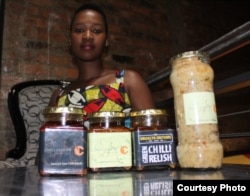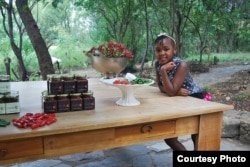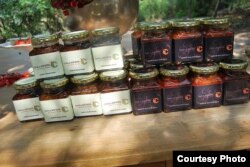Another face lights up brighter than the slot machine itself, as a lucky winner hits a jackpot inside Montecasino, Johannesburg's plush palace of gambling.
It's not the likeliest of settings to find a chili farmer, but it's where Leeko Nkala regularly delivers bottles of her chili sauce.
"Gamblers like it hot, you know!" she exclaims.
Today, the tall woman in her mid-30s doesn't look much like a farmer. She's wearing a colorful summer dress, scarlet lipstick and diamond earrings.
Nevertheless, farming is in Nkala's blood. She grew up next to her father's fruit orchard and on her grandparent's vegetable farm in North West Province.
"School holidays [my dad would tell me], ‘You're not going to play; are you crazy? You're staying home and helping mum can peaches.’ That's a technique or a process of canning that I learned back then that I'm using now in my business," she says.
So, from a young age, while her friends "wandered the streets and played games," Nkala was indoors making juice, jam and dried fruit.
"I'm grateful for that wisdom now, but when I was a kid I saw it as a punishment!" she comments, her red lips formed into a wide smile.
‘Interesting chili sauce’
Nkala says her path toward owning a food production company started when she was born, but was "truly sparked" a few years ago, when she was managing a branch of a large Italian restaurant chain.
"I became tired of serving just chopped up green chilies swimming in olive oil as a pasta and pizza condiment to customers,” she says. “I thought, ‘Surely there's something better to give people?' That's when I decided to develop my own special, interesting, flavorful chili sauce."
"The basic sauce that I first started with, it just so happened to be a chili sauce because I love chili; I put it in everything, even in cheesecake. … So for me it's always like, chili first, before salt.”
A food technologist helped Nkala refine her ideas.
"From the onset, I said to her I don't want to put any preservatives in it; whatever that we produce it has to be made out of fresh ingredients, no preservatives, no nothing [artificial]," Nkala emphasizes.
‘Literally on fire'
Nkala grew her most important ingredients, the chili peppers themselves, on her father's and grandfather's farms.
"My favorite is the jalapeno; I love jalapenos. Red jalapenos any day; no problem! I'll gobble them up, very quickly!" she says.
But, to achieve her mission, Nkala needed more of the fiery peppers. She sourced them from a group of female farmers near her home town of Makapanstad.
First, she cooked up her sauce at home, chopping chilies and experimenting until, as she says, she was "literally on fire."
"It just burns you; it goes into your pores!"
Then, Nkala adds, laughing, "I once got into the shower forgetting to wash my hands and I began washing, running my chili-covered hands all over my body. … That's a mistake I only made once!"
‘Overwhelming' response
Nkala added a secret blend of African herbs to her experimental sauce.
She eventually settled on using a chili cultivar that she says is of medium heat.
"It's hot with flavor,” she says. “That was the whole purpose: to say, don't kill the flavor of my food; enhance it. Get in there; step it up a bit."
She tested her creations, a sweet and sour chili sauce and a chili herb relish, at markets and food shows.
"The response that we got, it was, oh my gosh! Overwhelming. And then we started cooking until we couldn't keep up. So from the home kitchen we moved into, like, my double garages. It was like, yay! Oh wow, we're growing, we're growing. …"
Nkala's sauce proved so popular she had to move into a factory and employ a team to help her produce more.
She called her company Chilladiddo.
Nkala gives 10 percent of its profit to the farmers who supply her with chili peppers "to help them stay in the game, and to make sure they can continue selling us high-quality chilies."
The Chilladiddo burger
She ascribes demand for her sauces to her use of fresh, organic ingredients, like freshly pressed olive oil from one of South Africa's top olive farms.
Her condiments are now available at supermarkets around South Africa, and in restaurants like the Brooklyn Brothers franchise.
"We supply them in buckets,” Nkala says. “Then they use it at the back of the store to put it in burgers. They have a whole burger named after our product, which is nice."
Inside a Brooklyn Brothers branch in the suburb of Bedfordview, Denise Ntuli devours crispy fries slathered with Chilladiddo relish.
"Mmm!" she squeals, licking her lips. "It tastes yummy, and not too hot, just nice! Enough oil and perfect, it's balanced. It's even chunkier than the other sauces. I can eat the whole bottle!"
Africa-wide and on into Europe
Nkala says her sauces are extremely versatile, mixing well with meat, in omelets and on pizza.
Her business, however, has had challenges … like the year a hailstorm wiped out chili crops in the North West, and Nkala had to source peppers through another firm.
"They got like a wrong type of chili, like a very, very hot Bird's Eye. So I got in, I tasted and I'm thinking, Oh, hell no; we can't take this to market.' So it was a disaster, and it was a big batch and it was like, ‘Oh my gosh; we can't throw it away; what are we going to do with it?'"
Taking a "fat chance," Nkala added mayo to the excruciatingly hot mix ... in so doing unwittingly creating one of her current top sellers, a creamy "Chilinaisse."
She's now planning a range of new sauces, her motto being, "Prosperity through innovation."
Nkala plans to expand her business across Africa, and eventually into Europe.
And how about trying to break into the United States?
"America?" she asks, incredulously, before adding, "From what I've heard the U.S. has enough of its own hot sauces, but maybe it's time to offer people there a taste of Africa … hot Africa!"







